American Data Privacy and Protection Act (ADPPA)
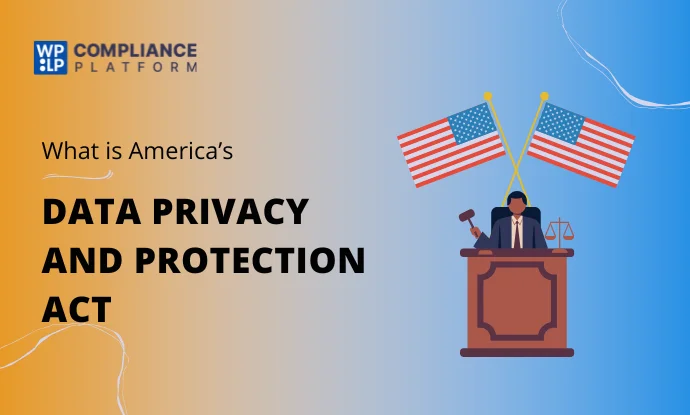
Are you aware of the American Data Privacy and Protection Act (ADPPA)?
The American Data Privacy Act is a bipartisan bill that provides privacy protection for United States residents.
It is the first comprehensive federal privacy legislation in the USA that will protect all U.S. consumers’ privacy.
The American Data Protection Act is just a bill, H.R. 8152, that provides insights into the anticipated structure of a future federal law in the United States.
This article examines the American Data Privacy and Protection Act, identifies who it applies to, and outlines the steps needed to comply with ADPPA.
- What is the American Data Privacy and Protection Act (ADPPA)?
- Who Does the American Data Privacy and Protection Act Apply?
- Do Businesses Have to Comply With the American Data Privacy Act?
- What Are The User Rights Under The American Data Privacy and Protection Act (ADPPA)?
- Business Obligations Under the American Data Privacy and Protection Act (ADPPA)
- How Business Organizations Can Comply with the American Data Privacy and Protection Act (ADPPA)
- FAQ
- Conclusion
What is the American Data Privacy and Protection Act (ADPPA)?
ADPPA, or the American Data Privacy and Protection Act, is a proposed bill in the US that seeks to give people more control over their personal data and set high privacy standards for companies.
The measure would give people the right to access, amend, and remove their personal data; it would also impose heavy fines for noncompliance and mandate that businesses seek individuals’ express agreement before collecting and utilizing their personal information.
ADPPA aims to create a standard federal privacy framework and augment current privacy legislation, such as the California Consumer Privacy Act (CCPA).
The House Committee on Energy and Commerce approved the ADPPA by a vote of 53-2 and placed it on Calendar No. 488, the Union Calendar, in December 2022.
Congress could not give it a formal hearing before the 117th Session adjourned in January 2023.
The American Data Privacy Protection Act (ADPPA) was introduced in 2022. Businesses and privacy experts shouldn’t write off the ADPPA because it didn’t make it to the House or Senate floors in the previous Congress, despite the bipartisan 53-2 vote that passed it out of committee.
Who Does the American Data Privacy and Protection Act Apply?
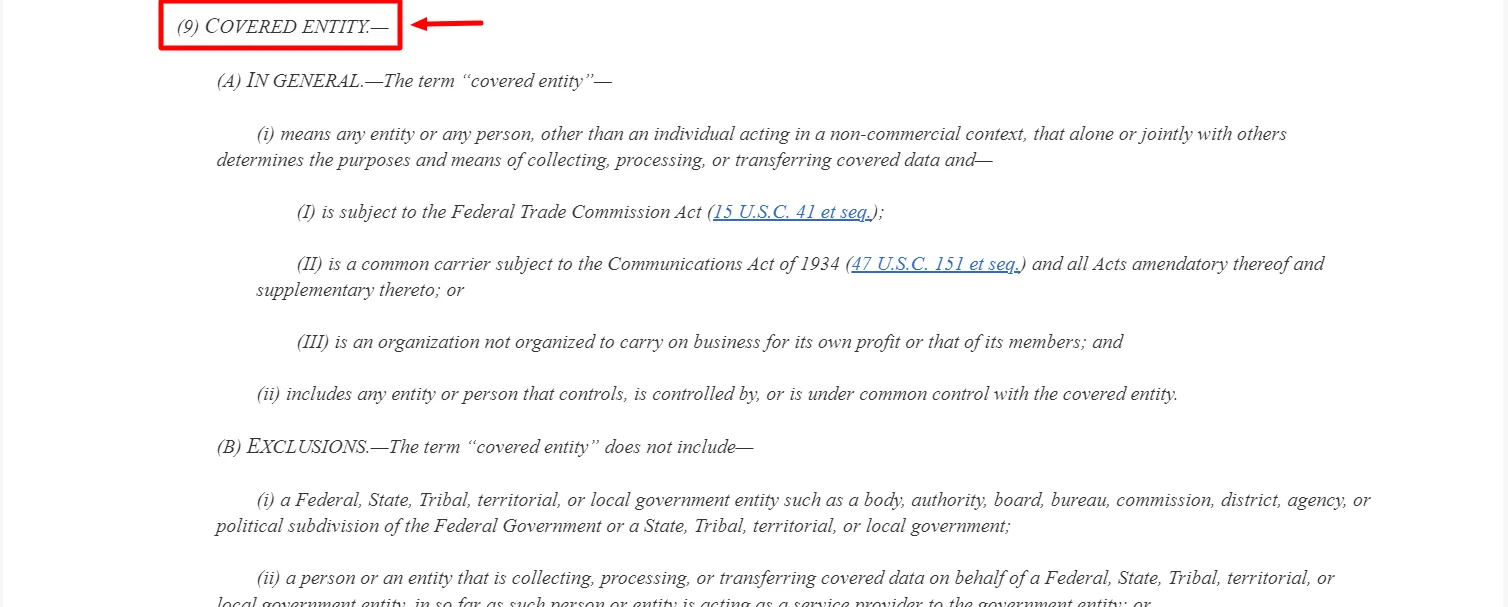
The American Data Privacy and Protection Act (ADPPA) applies to organizations that handle Americans’ personal data. The act restricts how these organizations gather, store, use, and share personal data and holds them accountable for maintaining their security and privacy.
As long as an organization gathers personal information about people residing in the United States, the ADPPA is applicable, no matter where it is based.
As long as an organization gathers personal information about people residing in the United States, the ADPPA is applicable, no matter where it is based.
The ADPPA applies to covered entities, defined as any organization or person that gathers and handles covered data, whether directly or through a third party.
Do Businesses Have to Comply With the American Data Privacy Act?
The American Data Privacy and Protection Act does not mandate compliance for corporations (ADPPA). The law provides businesses a voluntary framework to improve their data privacy and protection procedures.
It was created in response to growing worries about privacy and data security in the digital sphere. Adherence to the act is primarily based on the company’s specific data privacy and protection objectives.
Companies can show their dedication to data privacy and protection by adhering to the ADPPA, which could boost client loyalty and trust.
What Are The User Rights Under The American Data Privacy and Protection Act (ADPPA)?
The ADPPA contains various well-known privacy rights for users. It would have allowed people to access, update, and remove their personal data, much like the GDPR. Additionally, it would have strengthened people’s power to regulate what firms do with personal data by requiring “do not collect” and universal opt-out methods.
Some of the primary rights guaranteed by the draft include the following:
- Right of Access: All users are entitled to information regarding their data gathered, processed, or sent to outside parties. Users have the right to know what sources the data came from, why it was acquired, and whether any data was previously gathered but is no longer in the collecting entity’s control.
- Right to Deletion: Every user is entitled to ask that any company information about them be deleted. To guarantee that the disputed data is removed from the organization’s database, the organization must also inform any third parties with access to the data subject’s information about this request.
- Right to Correction: Users may ask that any information they have gathered that has subsequently grown erroneous, outmoded, or obsolete be corrected. The organization must also notify any third parties with access to this data of this request so that they can make the necessary corrections in their databases.
- Right to Refuse Data Transfers: Users can refuse any data transfers, including personal information. Users must be able to easily opt out of having their data shared with any third party using the opt-out method offered by the entity collecting their data.
- Right to Opt-Out of Targeted Advertising: Every user can choose not to receive any online targeted advertising from a company. The user can decline any further forms of targeted advertising via an easy opt-out mechanism.
Business Obligations Under the American Data Privacy and Protection Act (ADPPA)
Here are the obligations that ADPPA-covered entities are required to follow:
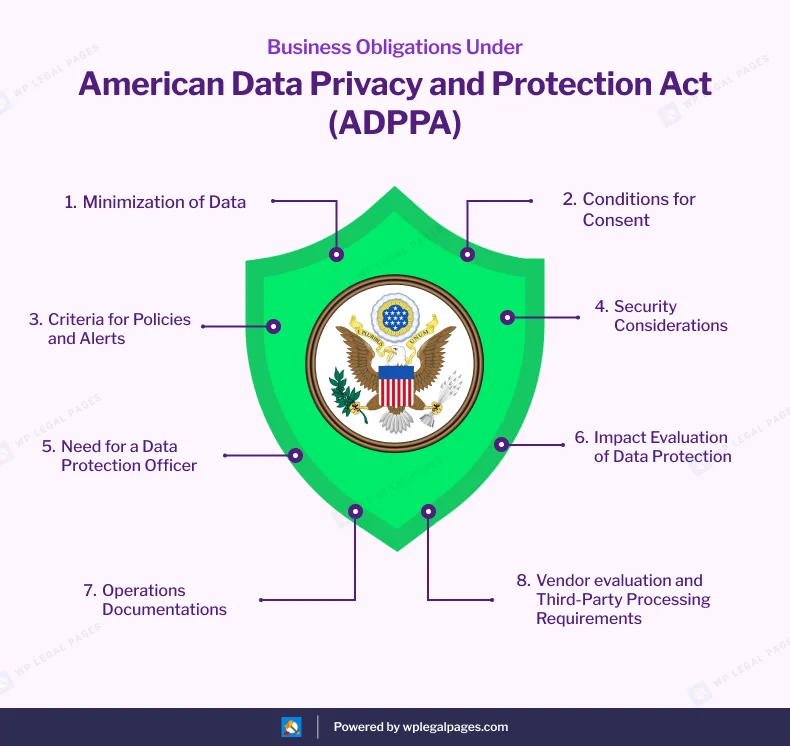
1. Data Minimization
A covered entity is not allowed to gather, use, or disclose covered data for purposes other than those that are clearly allowed by ADPPA and that are reasonably necessary and appropriate.
The collection scope should be restricted to fulfilling a particular request for a product or service from the individual or communications from the covered entity that the individual reasonably anticipates from the covered entity, given their relationship.
2. Consent Requirements
Without the user’s explicit and express consent, no organization can collect and process sensitive personal data (browsing history, genetic and biometric information, and geolocation data).
Similarly, the company cannot give such private information to outside parties without the user’s permission. Additionally, the company must give users simple ways to revoke their consent.
This implies gathering and handling users’ consent options should be as transparent as possible.
Before processing or transferring any previously collected covered data, a covered entity that modifies its privacy policies or practices must notify each person who will be impacted by the change and give each person a reasonable chance to contest the changes.
3. Privacy Notification/ Privacy Policy Requirements
The Act mandates that all organizations post a comprehensive privacy policy that is clear, noticeable, and easily available regarding their data collection, processing, and transfer operations.
The information listed below should be included in this privacy statement:
- The name and contact information of the organization that is gathering the data;
- The name and contact information of any outside parties that may have accessed this information.
- Types of information handled.
- Categories of processed data that are accessible to outside parties.
- The purpose of data processing.
- The reason for handling data that is accessed by a third party.
- How long will this gathered data be kept on file?
- How consumers may make use of their rights.
- The company’s procedures for data security.
- The date the privacy policy went into effect.
All users will also receive notifications of updates to this privacy policy. Considering the state of technology and the nature of the connection, the covered entity shall take all reasonable steps to notify each affected individual directly of any major changes to the privacy policy in each language in which the privacy policy is made.
4. Security Requirements
According to the Act, every company must create, implement, and maintain sufficient administrative, technical, and physical data security processes and procedures that guarantee suitable protections for all covered sensitive data.
Among the particular specifications are the following:
- Evaluate Vulnerabilities Within Current Practices & Systems: A company must evaluate its security practices and infrastructure to find any vulnerabilities or blind spots that could endanger the data gathered.
- Preventive and Corrective Action: An organization must mitigate any reasonably foreseeable risk or vulnerability to the gathered data by taking the required actions to adopt appropriate preventive and corrective measures.
- Evaluation of Preventive & Corrective Action: Implementing suitable preventive and corrective measures is insufficient. It’s also critical to regularly assess their efficacy in fending off the ever-changing threats that the gathered data must contend with.
- Information Retention & Disposal: Unless an individual has given explicit, affirmative consent to be retained, an organization must ensure that no data is kept longer than is necessary for the purpose for which it was acquired, processed, or transmitted.
- Training: To completely eliminate data mishaps caused by human error, a company must take proactive steps to guarantee that all of its personnel and employees are properly trained in the finest security standards.
- Designation: A company must appoint personnel to uphold and implement security procedures to safeguard any data gathered.
5. Data Protection Officer Requirement
According to the Act, a major data holder organization must appoint at least one privacy protection officer. This officer will answer directly to the top official.
- Create mechanisms to regularly review and update the large data holder’s privacy and security policies, practices, and procedures.
- Conduct thorough and frequent audits to verify that the major data holder’s policies, practices, and procedures are in place to ensure the organization complies with all relevant regulations.
- Create a program to inform and instruct staff members on compliance obligations.
- Ensure that all privacy and data security measures implemented by the major data holder are up-to-date, accurate, comprehensible, and clear in documentation.
- Operate as the intermediary between the big data owner and enforcement authorities.
6. Data Protection Impact Assessment
Under the American Data Protection Act, all businesses that satisfy the requirements to be considered big data holders must conduct a privacy impact assessment of all their practices relating to the processing, gathering, and transferring data no later than one year after the law’s implementation.
The following criteria need to be met for such an evaluation:
- The evaluation needs to be reasonable and appropriate in terms of the type and quantity of data that is gathered, processed, and transferred;
- The assessment’s findings must be recorded in writing and kept on file until the next evaluation;
- The organization’s relevant privacy officer must authorize the assessment.
7. Documentation of Processing Operations
According to the Act, all major data holders must keep accurate, up-to-date, comprehensible records of all their privacy and data security procedures.
8. Third-Party Processing Requirements and Vendor Assessment
Any firm that engages in third-party collecting must prominently display a notice on their website or mobile application.
Third parties may legitimately rely on representations made by the covered entity that transferred the third-party data regarding the expectations of a reasonable individual, provided that the third party undertakes reasonable due diligence on the representations of the covered entity and finds those representations credible.
Third parties are also prohibited from processing third-party data for processing purposes inconsistent with the expectations of a reasonable individual.
How Business Organizations Can Comply with the American Data Privacy and Protection Act (ADPPA)
Data processing companies must adhere to various duties and obligations outlined in different data regulation laws. These obligations typically include giving users control over their data and taking necessary measures to protect acquired data.
The following Practices can help businesses comply with the American Data Privacy and Protection Act:
By Creating a Privacy Policy that Complies with the American Data Privacy and Protection Act (ADPPA)
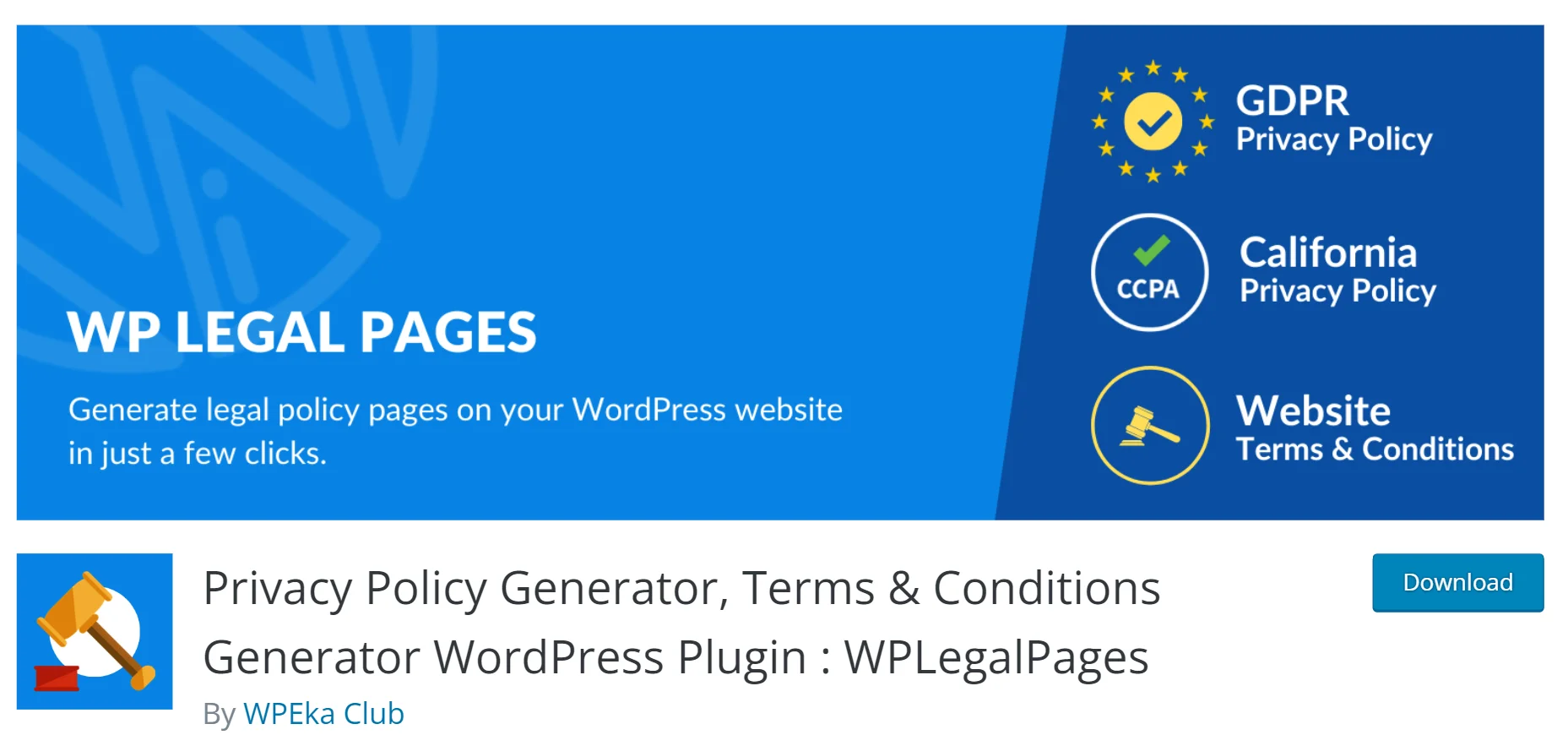
You can create a comprehensive privacy policy to help organizations comply with the law.
The company’s privacy policy will provide clear and concise information about how it handles personal information, including the types of data it collects, how it is used and shared, and individuals’ rights regarding their personal information.
We recommend using the WP Legal Pages plugin, which can simplify and streamline your journey toward data privacy. Simply answer a few questions to generate a personalized privacy policy to embed on your website.
By Creating a Cookie Banner For Your Business Website
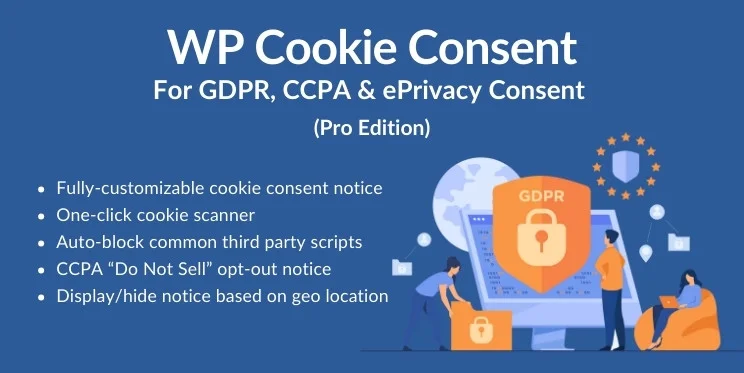
A cookie banner on your website will help you comply with data privacy laws and give visitors transparency and trust.
Respecting user privacy is crucial when analyzing user behavior. A consent management tool such as WordPress Cookie Consent can help.
A free WordPress plugin, WP Cookie Consent, simplifies creating cookie consent banners for any website.
The plugin also ensures compliance with other laws and privacy regulations, such as the e-privacy guidelines, GDPR, and CCPA.
Some features include data requests, white labeling, geo-targeting, script blocking, and cookie scanning. This plugin pays the utmost attention to user privacy while also helping to preserve legal compliance.
FAQ
American Data Privacy and Protection Act is the first federal-level data privacy law in the United States.
Businesses are required to implement specific policies and procedures to comply with the American Data Privacy Act. These include asking for explicit consent from users before collecting and using their personal data, allowing people to access and correct their personal data, and many more.
The American Data Privacy and Protection Act (ADPPA) applies to any business that collects or processes personal data of individuals in the United States.
Conclusion
In the digital age, maintaining privacy is challenging and needs cautious handling. This is where the US Data Regulation Law enters the picture. While the exact date of the federal data privacy law in the United States is unknown, the current ADPPA offers important information about what is probably in it.
The first official federal law in American history that prohibits companies from exploiting uncertainty to harm clients will offer complete protection.
To comply with the ADPPA, ensure your website has a current, well-defined privacy policy and that your company has dedicated privacy and data security procedures.
We advise using WP Legal Pages and the WP Cookie Consent plugin to comply with the American Data Privacy and Protection Act.
If you’ve liked reading this article, don’t forget to check our other similar articles:
- GDPR cookie consent: What’s really required and how can they be managed?
- Understanding Cookie Consent: A Guide For Website Owners
- How WP Cookie Consent Helps Your WordPress Site Adhere to CCPA Regulations
Want to design a beautiful cookie consent banner for your eCommerce website? Grab the WP Cookie Consent plugin now!
